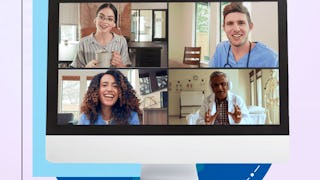Interprofessional Healthcare Informatics is a graduate-level, hands-on interactive exploration of real informatics tools and techniques offered by the University of Minnesota and the University of Minnesota's National Center for Interprofessional Practice and Education. We will be incorporating technology-enabled educational innovations to bring the subject matter to life. Over the 10 modules, we will create a vital online learning community and a working healthcare informatics network.

Gain next-level skills with Coursera Plus for $199 (regularly $399). Save now.

Interprofessional Healthcare Informatics

Instructor: Karen A. Monsen, PhD, RN, FAMIA, FNAP, FAAN
33,094 already enrolled
Included with
(314 reviews)
Skills you'll gain
- Informatics
- Geospatial Information and Technology
- Data Visualization
- Medical Terminology
- Healthcare Industry Knowledge
- Health Care
- Health Technology
- Health Information Management
- Healthcare Ethics
- Health Informatics
- Data Ethics
- Electronic Medical Record
- Graph Theory
- Community Health
- Public Health
- Clinical Informatics
- Telehealth
- Interoperability
Details to know

Add to your LinkedIn profile
9 assignments
See how employees at top companies are mastering in-demand skills

There are 11 modules in this course
What's included
1 video2 readings
Week 1 begins! This week, we explore and apply theories of healthcare informatics to professional practice. By the end of this week, you will be able to: describe informatics theory, analyze informatics theory related to practice and analyze health topics of interest to healthcare.
What's included
2 videos1 reading
This module explores and applies standardized terminologies to professional practice. By the end of this module, learners will be able to: analyze the transformation of data to information to knowledge and explore and apply standardized terminologies to professional practice.
What's included
3 videos1 reading1 assignment
This module links EHR use to evidence-based practice. By the end of this module, learners will be able to: identify the benefits and goals of an electronic health record and analyze evidence-based practice within the context of the electronic health record.
What's included
2 videos1 reading1 assignment
Week 5 begins! This week we examine informatics in relationship to new technologies in healthcare. Telehealth and technology are creating new ways to link people, and care, and health information. By the end of this week, you will be able to: examine applications of telehealth technologies and describe methods of engaging consumers in using health information technologies.
What's included
2 videos1 reading1 assignment
This module examines informatics in relationship to new technologies in healthcare. By the end of this module, learners will be able to: examine applications of telehealth technologies and describe methods of engaging consumers in using health information technologies.
What's included
3 videos1 reading1 assignment
This module relates informatics to community and population health. By the end of this module, learners will be able to: relate informatics to community and population health and analyze applications of geospatial information systems and health.
What's included
1 video1 reading1 assignment
This module describes applications of gaming, simulation, and virtual reality tools in healthcare. By the end of this module, learners will be able to: analyze informatics and gaming in relationship to health and healthcare and describe use of simulations and informatics to improve healthcare quality.
What's included
3 videos1 reading1 assignment
This module explores ethical issues related to healthcare informatics in the interprofessional context. By the end of this module, learners will be able to: explore ethical issues related to healthcare informatics in the interprofessional context and analyze security and privacy challenges related to healthcare informatics.
What's included
1 video1 reading1 assignment
This module explores interprofessional aspects of healthcare data exchange and interoperability. By the end of this module, learners will be able to: describe information exchange and interoperability and analyze interprofessional aspects of information exchange and interoperability in healthcare.
What's included
4 videos1 reading1 assignment
This module explores the contribution of healthcare informatics to the foundation of knowledge in healthcare. By the end of this module, learners will be able to: analyze implications of Big Data for healthcare research and synthesize insights related to interprofessional healthcare informatics.
What's included
4 videos1 reading1 assignment
Instructor

Offered by
Explore more from Data Analysis
 Status: Free Trial
Status: Free TrialUniversity of Minnesota
 Status: Free Trial
Status: Free TrialUniversity of Minnesota
 Status: Preview
Status: PreviewNortheastern University
 Status: Free Trial
Status: Free TrialDuke University
Why people choose Coursera for their career




Learner reviews
314 reviews
- 5 stars
63.69%
- 4 stars
23.56%
- 3 stars
7.96%
- 2 stars
2.86%
- 1 star
1.91%
Showing 3 of 314
Reviewed on Sep 9, 2015
A very high level overview of what needs to be done in the next n number of years to improve the population health by x times.
Reviewed on Feb 27, 2016
A very nice course to get end to end understanding of components involved in Healthcare practices.
Reviewed on Oct 11, 2016
Being in the medical field Its very useful course for me to understand EHR and other Healthcare information.

Open new doors with Coursera Plus
Unlimited access to 10,000+ world-class courses, hands-on projects, and job-ready certificate programs - all included in your subscription
Advance your career with an online degree
Earn a degree from world-class universities - 100% online
Join over 3,400 global companies that choose Coursera for Business
Upskill your employees to excel in the digital economy
Frequently asked questions
To access the course materials, assignments and to earn a Certificate, you will need to purchase the Certificate experience when you enroll in a course. You can try a Free Trial instead, or apply for Financial Aid. The course may offer 'Full Course, No Certificate' instead. This option lets you see all course materials, submit required assessments, and get a final grade. This also means that you will not be able to purchase a Certificate experience.
When you purchase a Certificate you get access to all course materials, including graded assignments. Upon completing the course, your electronic Certificate will be added to your Accomplishments page - from there, you can print your Certificate or add it to your LinkedIn profile.
Yes. In select learning programs, you can apply for financial aid or a scholarship if you can’t afford the enrollment fee. If fin aid or scholarship is available for your learning program selection, you’ll find a link to apply on the description page.
More questions
Financial aid available,

